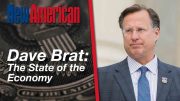
Cutting taxes is again in vogue in a Washington, D.C., increasingly dismayed by the utter inability of the massive Obama stimulus package to jolt the economy back to life. President Obama himself has become a grudging disciple of the Bush tax cuts, and is now advocating an extension of the tax reductions beyond their expiry at year’s end — but only for Americans earning less than $200,000.
However, an ex-Bank of England official, in an article on Bloomberg, wants to take the Bush tax cuts much farther. In addition to keeping the full Bush tax cuts in place, David Blanchflower is advocating suspending the payroll tax for 12-18 months, a move that would be an enormous boon to hard-pressed American taxpayers. “Households would experience an immediate 3.5 percent increase in disposable income that they could employ to sustain consumption and pay down debts,” Blanchflower writes. “And it would give an incentive to hire. This would inject an additional $625 billion a year and would jumpstart the economy.”
And, Blanchflower adds, the urgency for such measures has never been greater. Given persistently high unemployment, shattered consumer confidence, soaring public debt, and weak bank lending, “if we don’t act fast, a plunge into Depression is a growing risk in … the U.S.”
While such sentiments are laudable from the point of view of the taxpayer, it must be remembered that cutting taxes is only one half of the picture. At root, taxes are simply the price we pay for government, and if the price is reduced, the product should be shrunk as well. As Americans who remember the soaring deficits of the ‘80s, when the Reagan Administration rammed deep tax cuts through Congress without corresponding reductions in the size of government, tax cuts without government reductions are only a temporary band-aid. The result this time around will be no different, if deep tax cuts are not matched by long overdue cuts in unnecessary, unwieldy, and even unconstitutional government services. So bloated, indebted and underfunded has our federal government become, that national insolvency is looking more and more plausible, unless our elected leaders change course in a hurry.
The fundamental flaw in proposals like Blanchflower’s is that they assume— as nearly all modern economists, from Keynesians to monetarists, are wont to assume — that the key to economic health is fiscal policymaking. Put otherwise, self-styled mainstream economists tend to assume that it is government, by manipulating tax rates, interest rates, currency exchange rates, and the money supply, that is responsible for maintaining a sound, stable, dynamic economy by enlightened intervention in an otherwise chaotic marketplace. But the very best economic policy is for government to be kept to the absolute minimal size necessary, for it to refrain from fastening controls on the free market that hamper exchange and discourage capital formation, and for it to avoid debauching the value of money by printing worthless paper.
Neither lawmakers on Capitol Hill nor the President’s Council of Economic Advisors nor the financial panjandrums at Treasury and the Federal Reserve are wiser than the aggregate decisions of hundreds of millions of Americans. No central planning agency can possibly improve upon the wisdom of the free market. Our government, rather than trying to manipulate the economy by fiscal policy, however enlightened, would do far better to keep its size and operational expenses to a minimum to free up the greatest possible amount of private capital. That, and only that, is the only economic stimulus America needs.



